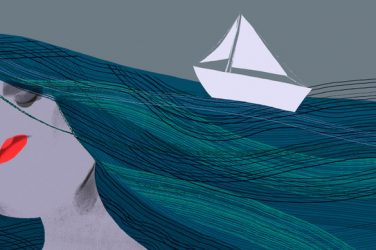In our previous issue, we published this article about the reversion of the right to abortion in Poland. This time, E&M‘s Julia Zalewska, born and raised in Poland, recounts her experience of continuously having to fight for her rights in 21st Century Europe.
I feel hopeless, overwhelmed. The country I live in I can hardly address as ‘mine’.
I love the places, the memories that have built my identity: the home furnished with vintage armchairs and an enormously big chest of drawers, where I love to lay on the wooden floor; the warm lakes surrounded by reeds, where I can swim during summer days with the sun immersing in the water; the festive meetings with family and friends, when people radiate energy and speak so loudly that the entire neighbourhood hears us. So many more thoughts come to my head, I could write another article about it.
There are also other memories, memories that I didn’t experience myself yet they impact who I am.
The painful and scarred history of Poland: I keep on learning, not even to know it by heart, but to remember it with heart – reflecting, understanding, and truly learning from it. I try to touch my roots.
This is why it hurts so much – my country is much more than just a spot on the globe.
I couldn’t leave it just like that.
This is why it hurts so much – my country is much more than just a spot on the globe.
Yet I don’t know how I can call Poland ‘my country’ if my rights are not respected here. In the eyes of the law, am I still a human being?
From now on, we are all warriors
Some time ago I read, or heard, a very true, and therefore saddening, quote by Olga Tokarczuk (a great Polish writer Noble Prize awardee):
“Women’s rights are not given once and for all. We must guard them like any other gain that extends the scope of civil liberties and human dignity. From now on, we are all warriors. ”
On 22nd of October 2020, the Constitutional Court in Poland restricted abortion law. It is now impossible to get an abortion even if the foetus suffers from major defects; termination of pregnancy will only be allowed in cases of rape or incest, or if the mother’s health is at risk.
A contentious near-total ban on abortion in Poland went into effect on the 27th of January 2021, despite rampant opposition from hundreds of thousands of Poles, who during the Fall gathered for some of the largest demonstrations in the country since the collapse of communism in 1989.
In the midst of the COVID-19 pandemic, people were forced to go out on the streets to fight for their rights. What can you call this government, which forces its citizens to risk their health and their lives? The police suppressed the protests in a brutal way, using truncheons and gas against those participating.
Misinterpretation of the Constitution
The Constitutional Court passed a ruling that halts the termination of pregnancies for foetal abnormalities. In its justification, the Court writes about abortion as follows: “Termination of pregnancy involves the deprivation of a child’s life. As long as this child is not denied the right to life, his legal protection is limited”.
Kamila Ferenc, a lawyer from the Federation for Women and Family Planning, comments for OKO.press: “The justification is written to prove the thesis in a very primitive way, indefensible in the light of the Constitution and international standards for the protection of human rights. The Court misinterprets the Constitution. It is not able to differentiate the protection of life, it only arbitrarily personifies the foetus and equates it with the human being born ”.
“We are dealing with incompetence, corruption, a total decay of the state, so these men are doing what they know best — taking away rights and freedoms from the citizens,” Marta Lempart, a protest organizer, told the television station TVN24. “This is about women, but also about all other minorities and majorities that Law and Justice hates.”
What future for Poland?
Each time I write an article on this subject, tears roll down my face. In Poland, the “Black Protests” (the first women protests in Poland were called ‘black protests’ as we all wore black to express our mourning over the loss of human rights) to fight for women’s rights to have an abortion have been going on for years now: Black Monday took place on 3rd of October of 2016.
The situation seems to get more and more serious, as the voice of citizens is constantly disregarded. “Poland took first place in the ranking of autocratizing countries, with a dramatic decline in the liberal democracy index by 34 percentage points, and this decline has been visible since 2015,” emphasized the authors of the Democracy Report 2021.
Poland also falls to a lower position in the World Press Freedom Index every year. The Reporters Without Borders Report states: “The government’s drive to subjugate the judicial system and a growing tendency to criminalize defamation are beginning to have an effect on the freedom of expression of independent media outlets. Some courts are now using article 212 of the criminal code, under which journalists can be sentenced to as much as a year in prison for defamation, although the civil code offers citizens all the protection they need if they are defamed. Even if the courts usually content themselves with fining journalists, the use of article 212 encourages self-censorship by the independent media.”
I hope we do have the strength and awareness not to let history repeat itself
State-owned media are currently unreliable, broadcasting misleading information, which can only be called government propaganda. The level of absurdity achieved leaves room only for memes, which can help a little to cope with the situation. But honestly, how can one live in a country you can only make fun of?
The warriors are tired, yet we cannot stop fighting. It frightens me to think of where Poland is headed, knowing where it has been before. The decisions made by the government seem to be surreal given that we live in 21st Century Europe. I hope we do have the strength and awareness not to let history repeat itself. Going back is not the way to go.
Cover photo: Photo by Womanizer WOW Tech on Unsplash, Unsplash licence










